197班公开课unit2A(1a-2d)
人教版七年级初中英语 Unit2_SectionA(1a-1c)优质课教案(1)

Unit2 SectionA(1a—2d)优质课教案教学过程及内容:Step 1 :Warm-upDaily greetings to the students and ask them some questions.For example:What is this in English/What color is it/What is your name?Step 2 :Lead in1.Show some pictures of teacher’s family and ask the students who they are. Then lead new words and sentences of Today.2.Teach new words and let them practice sentences.T: Who is/are she/he/they?...S: She/He/They is/are my grandparent/partents…(Tips:In this sentences,we have to pay attention to“are” and “s”)Step 3 :Presentation1.1a.Let students do 1a use the multi-media.2.1b.Listening Part.Circle the words you hear in 1a.3.Play the sound recording again and let students follow. Step 4 :Teaching and practice1.1c Let students play the role in 1a.2.Talk about the the other people in the convertion. Role-play conversation:A: That’s my family. Those are my parents.B: Who’s she?A: She’s my sister. Oh, and these are my brothers.Step 5 :ConsolidationThe new words and the sentences.Step 6 :Problem-solving按要求完成下列各题。
Unit2SectionA1a_2d课件人教版英语九年级全册

1. stranger n. 陌生人(可数名词) strange adj. 陌生的,奇怪的
the Spring Festival
When? January 1st on the lunar calendar What activities? pay a New Year call
get lucky money eat together watch Chunwan
the Water Festival
A: What did you do on your vacation? B: I visited my cousins. I think that we ate five meals a
day! I’ve put on five pounds. A: I guess the food was delicious, right?
admire the moon eat mooncakes
the Dragon Boat Festival
When? May 5th on the lunar calendar What activities? watch the boat races
eat delicious zongzi memorialize Qu Yuan
I wonder whether June is a good time. Wu Ming:Yes, if you want to see the boat races.But it’s
【英语教案】Unit2SectionA(1a-2d)教案
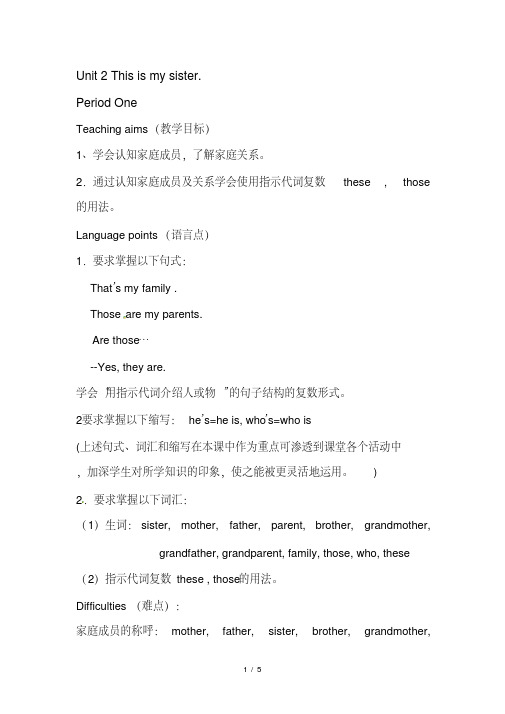
Unit 2 This is my sister.Period OneTeaching aims(教学目标)1、学会认知家庭成员,了解家庭关系。
2.通过认知家庭成员及关系学会使用指示代词复数these , those 的用法。
Language points(语言点)1.要求掌握以下句式:That’s my family .Those are my parents.Are those…--Yes, they are.学会“用指示代词介绍人或物”的句子结构的复数形式。
2要求掌握以下缩写:he’s=he is, who’s=who is(上述句式、词汇和缩写在本课中作为重点可渗透到课堂各个活动中,加深学生对所学知识的印象,使之能被更灵活地运用。
)2.要求掌握以下词汇:(1)生词:sister, mother, father, parent, brother, grandmother, grandfather, grandparent, family, those, who, these (2)指示代词复数these , those 的用法。
Difficulties(难点):家庭成员的称呼:mother, father, sister, brother, grandmother,grandfather, friend, uncle, aunt, cousin, parents介绍和辨别人物的基本句型:This/That is ... These/Those are... Teaching steps(教学步骤)1. Warming-up and revision(课堂热身和复习)(1) Warm greetings to the students.T: Hello! / Hi!S: Hello! / Hi!2. Presentation(呈现新知识)拿出自己的全家福照片给学生看,通过简要介绍家庭成员引出家庭的话题。
新课标 Unit 2 Section A (1a-2d) 教案

Unit 2 What time do you go to school?Section A 1 (1a-2d)一、教学目标:1. 语言知识目标:1) 能掌握以下单词:up, get up, dress, get dressed, brush, tooth (pl. teeth) brush teeth, shower, take a shower, usually, forty, fifty, wow, never, early, job, work, station, radio station, o'clock, funny, exercise能掌握以下句型:①—What time do you usually get up? —I usually get up at six thirty.②—When do you go to work? —I usually go to work at eleveno'clock.③—He has an interesting job. —He works at a radio station.2) 用when和what time引导的特殊疑问句询问时间和时间的表达法;用所学的目标语言对生活和学习活动做计划,学会合理地安排作息时间。
2. 情感态度价值观目标:本部分的话题是“日常作息时间”,学习内容贴近学生的生活,因为学生的作息时间安排是非常有规律的。
通过互相询问或谈论自己或对方的作息时间安排和活动计划,可以培养学生良好的作息习惯和守时习惯。
二、教学重难点1. 教学重点:1) 掌握时间的简单表达方式。
2) 学习询问和谈论时间和制订作息时间表。
2. 教学难点:when和what time引导的特殊疑问句和时间的表达法。
三、教学过程Ⅰ. Warming-up1. Greet the Ss as usual.2. Let’s talk about our daily activities.What do you usually do in the morning?get up brush teeth take a shower eat breakfast get dressed go to schoolⅡ. Presentation1. 出示几幅反映日常事务(如:起床、上学、跑步等)的图画,引导学生谈论这些日常事务go to school,get up,run,take a shower,eat breakfast等,学习有关的动词短语。
Unit2 SectionA 1a-2d 课件 人教版七年级英语上册

Are those/these...? Yes,they are. No,they aren’t.
-Is that a pen ?
- Yes,it is. - No,it isn’t.
-Are these oranges ? - Yes,they are. - No,they aren’t.
-Are those pens ? - Yes,they are.
- No,they aren’t.
Listen to the conversations.
1. Mother 3. parents 5. grandmother 7. friend 9. sister
2. father 4. brothers 6. grandfather 8. grandparents
A: That’s my family. Those are my parents. B: Who’s she? A: She’s my sister. Oh, and these are my brothers. B: Who are they? A: They're my grandparents.
二、 单项选择
1.
His
mother’s
D
________is
his
grandmother.
A. grandfather
B. grandmother
C. grandparents
D. mother
2. — Who’s he? — _____. C
人教英语七上 Unit2 SectionA(1a-2d)教案设计

Unit2 SectionA(1a—2d)优质课教案(新疆省)一.教材分析(一.)教材背景分析本单元围绕介绍家庭成员开展听说读写教学活动,中心话题是This is my sister,学生的学习活动是在真实的生活场景中展开的。
并把名词的单、复数形式这一语法主线贯穿其中。
教学内容为语法的学习和使用提供了必要的感性材料,同时也体现了语法项目与交际情景自然结合的特点。
(二.)教学内容分析本单元的中心话题是介绍家人和亲属。
语法内容是一般名词的单、复数形式与be动词、指示代词(this、that、these、those)之间的关系。
二.教学目标:Ⅰ.Knowledge and skills1.学会表述家人的称谓, 区分家人的称谓..2.学会介绍家人.3.能区分单复数形式Language points: (语言点)1.要求掌握以下句式:------This is ...------That is ...------These are ...------Those are ...2.要求掌握以下词汇:(1) 名词: sister, mother, father, parent, brother, grandmother, grandfather, grandparent(2) 代词: this, that, these those Ⅱ.Process and methods.1. Listening and speaking practice.2. Autonomous and cooperative approach. Ⅲ.Emotion, attitude and values.Lead students to know their family members well and love their family.三.教学重点要求掌握以下词汇:(1) 名词: sister, mother, father, parent, brother, grandmother, grandfather, friend, grandparent(2) 代词: this, that, these those四.教学难点本课的难点是学生要区分和掌握家人的称谓, 而学生在初次接触的时候, 要分清楚各个称谓会有一定难度。
unit2sectiona(1a-2d)课件.ppt
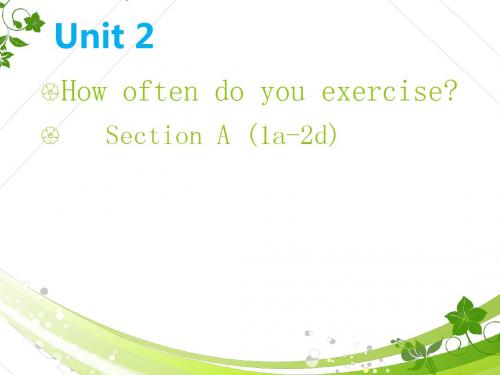
I watch TV every day
once a week twice a week three times a month
I never watch TV
Oral practice How often do you do these activities?
Jack: Hi, Claire, are you free next week?
Claire: Hmm…next week is quite full for me, Jack.
Jack: Really? How come?
Claire: I have dance and piano lessons.
1a Look at the picture. Make a list of the different weekend activities.
1. help with housework 2. _r_ea_d__b_o_o_k_s___ 3. e_x_e_r_c_i_se______ 4. w__a_t_ch__T_V_____ 5. _g_o_s_h_o_p_p_i_n_g__
How often every day once a week twice a week three times a week once a month twice a month
2c.How often do you do these activities? Fill in the chart and the make conversations.
go swimming once a month
A: How often does he .....? B: He goes ..... once a month.
Unit2SectionA(1a2d)课件人教版七年级英语上册

She is my sister. Oh, and these are my brothers.
1b Listen and circcieclicei
1. mother_____ 2. father _____ 3. parents _____ 4. brothers _____ 5. grandmother____ 6. grandfather ____ 7. friend ____ 8. grandparents____ 9. sister ____
• 考点4 parent n.父(母)亲 • 考向: parent 指父亲或母亲,而加-s之后,变成复数,指父母二人。
根据parent 的单复数变化,动词的单复数形式也发生相应变化。 • e.g.This is my parent.这是我的父(母)亲。 • My parents are strict.我的父母严厉。 • <考题4>Your parents______(be) here. • 点拨:用主谓一致法解题。主语Your parents是复数, • 因此 be 动词用are。
Exercises
1. __C____ two girls are Lucy and Gina. A. This B. That C. Those D. They
2. This __B____ my sister and those ______ my parents. A. is, is B. is, are C. are, is D. are, are
• <考题2>This______a big family. The family______happy.(be) • 点拨:在第一句中,强调整体,故用is;在第二句中, • 指家庭成员幸福,因此用 are。
英语八年级上册Unit2A(1a-2d)教学课件(晒课)

always (100%) usually often sometimes hardly ever never (0%)
_e_x_er_c_i_se_,___re_a_d__________ ______w_a_t_c_h_T_V__________ __h_e_l_p_w__it_h__h_o_u_s_ew__o_r_k___ ______g_o__s_h_o_p_p_in__g______ _______w_a_t_c_h__T_V________ _______g_o_s_h_o_p_p_i_n_g______
He / She usually … always … sometimes … often …
What does he / she usually do on weekends?
He / She usually … always … sometimes … often …
Consolidation
three/four/five/six … times a month / year 一月/年 三/四/五/六……次
Ask and Answer
Ask your partner like this: 1. How often do you eat sweets? 2. How often do you play tennis?
Presentation
1a Make a list of the weekend activities.
bc
d
e a
What do you usually do on weekends? I often go to the movies.
1. help with housework 2. watch TV 3. exercise
Unit2SectionA(1a2d)课件人教版七年级英语上册

family
m other
f ather
Father and mother, I love you.
Leading in
How many people are there in your family? Who are they?
Leading in
Family members
These are my family.
A: Who are they? B: They are my ….
Let’s talk
We have known our friends’ families. What about you?
Let’s talk Let’s talk about your own family with your partners.
brother
A girl is introducing her family.
Let’s listen Listen and circle the words you hear.
parents
mother
grandmother grandfather
father friend
sister
brother
表示“这个,那个,这些,那些”等明确指示人或事物的 代词,称为指示代词。指示代词有this, that, these, those。
近指
指代单数 This is my friend. 指代复数 These are my friends.
远指
指代单数 That is /That's my parent. 指代复数 Those are my parents.
Let’s talk 2c Practice the conversations in pairs. Who’s she?
unit2 sectiona 1a-2d 课件 2023-2024学年人教版七年级英语

Revision
What time do you usually get up? I usually get up at six forty.
What time does Frank usually eat breakfast? He usually eats breakfast at six thirty.
Pair work
What time does Rick usually go to school?
He usually goes to school at seven
thirty.
活动小结
通过以上的活动,我们可以知道,对时刻进行提 问用1.__w__h_a_t _ti_m_e___,如果主语是第一人称、第二 人称或第三人称复数形式,助动词用2.___d_o___;如 果主语为第三人称单数形式,助动词用3.__d_o_e_s__。 具体的时刻前面用介词4.___a_t __。
Jim has __t_w_o___brothers and __t_w_o___ sisters. But Jim’s Family only has __o_n_e___shower.
2b Listen again. Complete the shower schedule for Jim’s family.
拓展:常用的频率副词及动作发生的频率为: always(总是,一直)100% usually(通常)80% often(经常)约60% sometimes(有时)20% never(从 不)0%
活
学 活 7:00 用7 o’clock
7:15 15 past 7
6:25 25 past 6
9:30
to
分钟数超过 30分
Unit2SectionA1a2d课件人教版七年级英语上册2

Listen and circle the words you hear.
parents brother friend
mother father sister grandmother grandfather grandparents
Task
1. Is this Li Lan’s family photo? No, it’s Cindy’s family photo.
Read and fill in the blanks.
Sally: Good morning, Jane. Jane: Good morning, Sally. Sally: Oh, Jane, _th__is_i_s_m__y_s_i_s_te_r_K__a_t_e_.
Kate, _t_h_is__is_m__y__fr_i_e_n_d_J_a_n_e__. Kate: _N__ic_e_t_o__m_e_e_t_y_o_u__, Jane. Jane: Nice to meet you, too. _A__re__t_h_o_se__y_o_u_r_p_a_r_e_n_t_s_? Kate: Yes, they are.
bmryot_h_e_r_s_. ___.
Work in pairs
A: That’s my family. Those
are my _g_r_a_n_d__p_a_r_e_n_t_s_.
B: Who’s she/he?
A: She’s/He’s my _m_o__th_e_r_. Oh, and these are my _b_r_o_t_h_e_r_s_.
1. mother__a___ 2. father ___c__ 3. parents __b___ 4. brothers __h___ 5. grandmother__f__ 6. grandfather _e_ 7. friend __i__ 8. grandparents__d__ 9. sister __g__
2.1Unit2SectionA(1a-2d)教案-2021-2022学年七年级英语上册(人教版)

(三)实践活动(用时10分钟)
1.分组讨论:学生们将分成若干小组,每组讨论一个与家庭成员和职业相关的实际问题。
2.实验操作:为了加深理解,我们将进行角色扮演活动。这个活动将演示如何在实际情境中使用所学词汇和句型。
2.1 Unit 2 Section A (1a-2d)教案-2021-2022学年七年级英语上册(人教版)
一、教学内容
2.1 Unit 2 Section A (1a-2d)教案-2021-2022学年七年级英语上册(人教版)
本节课主要围绕Unit 2 My family的主题展开,教学内容包括:
2.教学难点
-词汇记忆:学生可能难以记住所有的家庭成员和职业词汇,尤其是那些不常见的词汇。
-语法运用:使用正确的时态和冠词(a, an)来构造句子,对于一些学生来说可能是个挑战。
-听力理解:学生可能需要在听录音时,快速识别并理解家庭成员和职业的词汇,这要求他们具备一定的词汇量和听力技巧。
-口语表达:在角色扮演活动中,学生需要灵活运用词汇和句型,同时注意语音语调的正确性。
(二)新课讲授(用时10分钟)
1.理论介绍:首先,我们要了解家庭成员和职业的基本英文表达。这些词汇和句型是进行自我介绍和交流的重要工具,它们在我们的日常生活中有着广泛的应用。
2.案例分析:接下来,我们来看一个具体的案例。这个案例展示了如何用英语介绍家庭成员及其职业,以及这些表达如何帮助我们与他人更好地沟通。
其次,在教学过程中,我对重点难点内容的强调和解析还不够到位。有些学生对家庭成员和职业词汇的运用仍然不够熟练,语法错误也时有发生。针对这个问题,我打算在接下来的课程中,增加一些专项练习,帮助学生巩固知识点,提高他们的语言表达能力。
人教版英语七年级上册教案:Unit2 SectionA(1a-2d)-最新教学文档
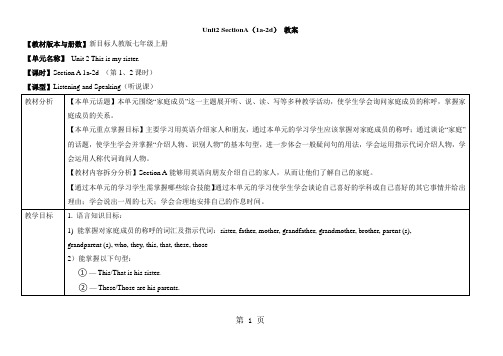
家庭是幼儿语言活动的重要环境,为了与家长配合做好幼儿阅读训练工作,孩子一入园就召开家长会,给家长提出早期抓好幼儿阅读的要求。我把幼儿在园里的阅读活动及阅读情况及时传递给家长,要求孩子回家向家长朗诵儿歌,表演故事。我和家长共同配合,一道训练,幼儿的阅读能力提高很快。【单元名称】Unit 2 This is my sister.
2)The usage of demonstratives pronouns:this, that, these, those
2.教学难点:
1) the plural forms of thedemonstratives pronouns.
④— Is this/that your sister?
—Yes, she is./No, she isn't.
⑤— Are these/those your parents?
人教7下unit2sectiona1a-2d教案设计.docx
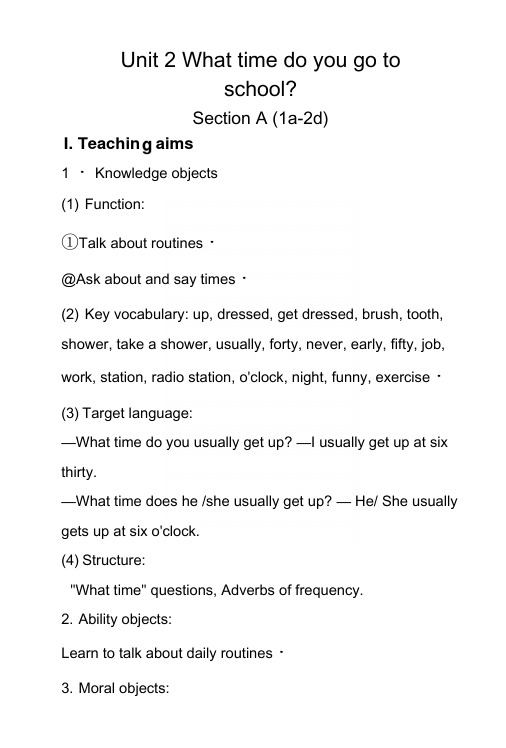
Unit 2 What time do you go toschool?Section A (1a-2d)I. Teachin aims1 ・ Knowledge objects(1) Function:①Talk about routines・@Ask about and say times・(2) Key vocabulary: up, dressed, get dressed, brush, tooth, shower, take a shower, usually, forty, never, early, fifty, job, work, station, radio station, o'clock, night, funny, exercise・(3) Target language:—What time do you usually get up? —I usually get up at six thirty.—What time does he /she usually get up? — He/ She usually gets up at six o'clock.(4) Structure:"What time" questions, Adverbs of frequency.2. Ability objects:Learn to talk about daily routines・3. Moral objects:The students arrange their own time reasonably by themselves ・II. Teaching key pointsTalk about routines.III. Important and difficult points:Important points: the key phrases and the new words. Difficult points: Ask about time and talk about routines. IV. Teaching Methods:Task-based teaching methods, comm un icative teachi ng method , situational method , practice method and make a survey ・V. Teaching aids:Multi-medium computer, powerpoint , pictures and recorder. VI. Teaching procedures:Step 1. GreetingsStep2. Warming up1. Enjoy a song.2. Look at the clocks and say what time it is.Step3. PresentationShow the pictures to present the new phrases・get up , take a shower, get dressed, brush the teeth, eat breakfast, go to school.Step 4. PracticeLet the students match the activities with the pictures・Check the answers・Step5・ presentation1 ・ Present the sentence structures:What time do you usually get up/ take a shower....?I usually get up/ take a shower••…at....(The usage of the word “usually”.)2. The teacher gives some examples・Step6. Practice1. Pairwork.Make conversations according to the pictures・Using: A:What time do you usually ・・・?B: I usually ・・・ at..・/ A: What time does he/she usually...?B: He/ She usually .... at...2 Listen and match the times with the actions・ Draw lines from the clocks to the pictures.Check the answers.3. Listen to the conversation and complete the sentences・Check the answers・4. Listen again. Complete the shower schedule for Jim's family.(The students give the answers.)Step7・ PresentationPresent the new words and phrases in 2d.an interesting job, funny, radio station, radio show, exercise, go to workStep 8 Practice1. Read the conversation in 2d・ Fill in the blanks・2. Role-play the conversationStep9. InterviewInterview three of your partners in your group・ Find out what time they do these activities. Then give a report to the class.SteplO. SummaryMake a short summary about this lesson.Step11.ExerciseFill in the blanks.Check the answers・Stepl 2.Homework1 ・ Remember the new words and phrases・2. Introduce your day.Written form on the blackboard:Unit 2 What time do you go to school? Section A (1a-2d) What time do you usually get up? I usually get up at six thirty. What time does he/she usually get up? He/ She usually gets up at seven. get uptake a showerget dressedbrush the teetheat breakfast。
人教版九年级英语全册Unit2SectionA(1a-2d)教案
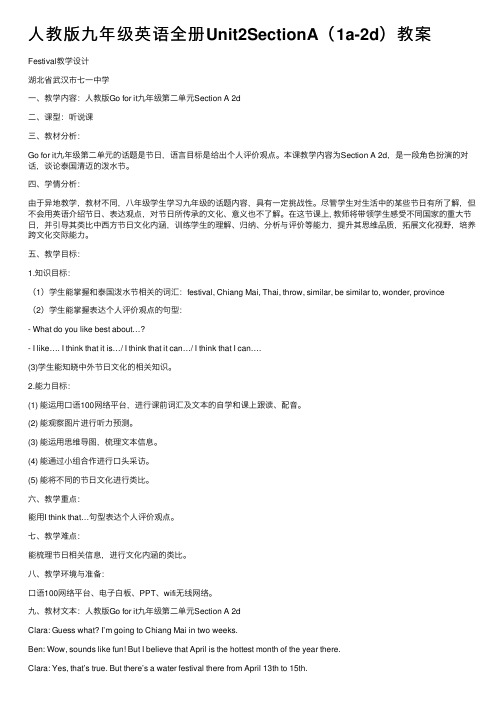
⼈教版九年级英语全册Unit2SectionA(1a-2d)教案Festival教学设计湖北省武汉市七⼀中学⼀、教学内容:⼈教版Go for it九年级第⼆单元Section A 2d⼆、课型:听说课三、教材分析:Go for it九年级第⼆单元的话题是节⽇,语⾔⽬标是给出个⼈评价观点。
本课教学内容为Section A 2d,是⼀段⾓⾊扮演的对话,谈论泰国清迈的泼⽔节。
四、学情分析:由于异地教学,教材不同,⼋年级学⽣学习九年级的话题内容,具有⼀定挑战性。
尽管学⽣对⽣活中的某些节⽇有所了解,但不会⽤英语介绍节⽇、表达观点,对节⽇所传承的⽂化、意义也不了解。
在这节课上, 教师将带领学⽣感受不同国家的重⼤节⽇,并引导其类⽐中西⽅节⽇⽂化内涵,训练学⽣的理解、归纳、分析与评价等能⼒,提升其思维品质,拓展⽂化视野,培养跨⽂化交际能⼒。
五、教学⽬标:1.知识⽬标:(1)学⽣能掌握和泰国泼⽔节相关的词汇:festival, Chiang Mai, Thai, throw, similar, be similar to, wonder, province(2)学⽣能掌握表达个⼈评价观点的句型:- What do you like best about…?- I like…. I think that it is…/ I think that it can…/ I think that I can….(3)学⽣能知晓中外节⽇⽂化的相关知识。
2.能⼒⽬标:(1) 能运⽤⼝语100⽹络平台,进⾏课前词汇及⽂本的⾃学和课上跟读、配⾳。
(2) 能观察图⽚进⾏听⼒预测。
(3) 能运⽤思维导图,梳理⽂本信息。
(4) 能通过⼩组合作进⾏⼝头采访。
(5) 能将不同的节⽇⽂化进⾏类⽐。
六、教学重点:能⽤I think that…句型表达个⼈评价观点。
七、教学难点:能梳理节⽇相关信息,进⾏⽂化内涵的类⽐。
⼋、教学环境与准备:⼝语100⽹络平台、电⼦⽩板、PPT、wifi⽆线⽹络。
人教版(2024)英语七年级上册Unit2 sectionA 1a~1d课件

uncle
uncle
Her grandfather is her father’s or mother’s father.
aunt
aunt consin
Ⅰ. What is a family?
Peter:Yes, they are.
Teng Fei: Who’s he?
Peter: He is my father’s brother, my uncle. And this is my aunt.
Teng Fei: Who’s she?
询问身边的人是谁时用who来
Peter: She is my sister, Helen.
Yaming’s parents
Peter‘ parents
Yaming
uncle aunt
Helen
grandparents
Jim
David
Teng Fei
Ella
Yaqi
Peter
Ⅱ. Some new friends’ family.
Listen again and complete the sentences.
Ⅰ. What is a family?
Let’s get to know the girl’s family.
uncle
grandfather grandmother
mother
father
brother aunt
uncle aunt consin
Ⅰ. What is a family?
Let’s get to know the relationship between her family.
(新)人教版三下英语《Unit2 A 第一课时》教案(一等奖)
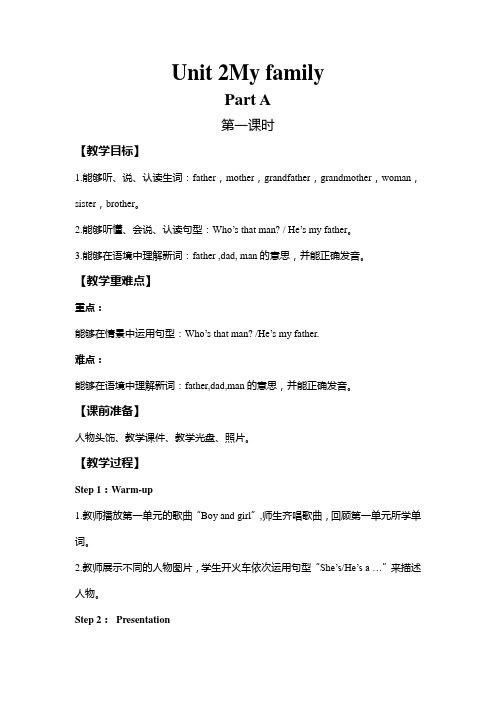
Unit 2My familyPart A第一课时【教学目标】1.能够听、说、认读生词:father,mother,grandfather,grandmother,woman,sister,brother。
2.能够听懂、会说、认读句型:Who’s that man? / He’s my father。
3.能够在语境中理解新词:father ,dad, man的意思,并能正确发音。
【教学重难点】重点:能够在情景中运用句型:Who’s that man? /He’s my father.难点:能够在语境中理解新词:father,dad,man的意思,并能正确发音。
【课前准备】人物头饰、教学课件、教学光盘、照片。
【教学过程】Step 1:Warm-up1.教师播放第一单元的歌曲“Boy and girl”,师生齐唱歌曲,回顾第一单元所学单词。
2.教师展示不同的人物图片,学生开火车依次运用句型“She’s/He’s a …”来描述人物。
Step 2:Presentation1.教师指着教室里一位远处的女孩,假装不认识地问:Who’s that girl? 引导学生运用句型She’s …来回答。
2.用同样的方式指着教室里远处的一位男孩,并问:Who’s that boy?引导学生运用句型He’s…来回答。
3.同桌之间模仿教师运用句型:“—Who’s that boy/girl? —He’s / She’s …”来进行问答。
4.教师拿出学生们其他科目教师的照片,并问:Who’s that man?让学生体会man 和boy的区别。
并引导学生运用“He’s Mr…”来回答。
5. 教师出示自己父亲的照片,并介绍He’s my dad./He’s my father.,帮助学生理解dad和father的意思、区别。
教师边介绍边板书教读,注意dad和father的发音。
介绍之后,教师提问:Who’s that man?学生回答。
- 1、下载文档前请自行甄别文档内容的完整性,平台不提供额外的编辑、内容补充、找答案等附加服务。
- 2、"仅部分预览"的文档,不可在线预览部分如存在完整性等问题,可反馈申请退款(可完整预览的文档不适用该条件!)。
- 3、如文档侵犯您的权益,请联系客服反馈,我们会尽快为您处理(人工客服工作时间:9:00-18:30)。
Learn by yourself
一、独学:轻声朗读本节课生词和短 语,把不会的圈起来。 二、独立完成导学案的预习反馈部分
并标记疑点。
三、学科组长检查导学案。
小 第一组 第二组
组
后板展示预习反馈题号 第1和7 第2和8
第三组
第四组 第五组 第6组
第3和9
第4和10 第5和11 第6和12
Pair work and group work
记住好好锻 炼身体哟!
A: Hi , Jack ,How often do you go to the movies? A B: 1(________) How about you ,Jimmy? A: Me, too. 2(_______) B B: No, I don’t. A: 3(_______) C B: Three times or four times a week. A: 4(______). F B: Animal World . A: I like Animal World ,too. B: And you often go shopping? A. Once a week. A: No, I don’t. B. Do you go shopping every day? B: 5(_____) D C. How often do you watch TV? A: About twice a month. D. How often do you go shopping?
E. Do you watch TV every day? F. What’s your favorite program?
2. 根据句子意思,用括号内的所给词的适当形式 填空。 (1) –What does your father_______(do) on do weekends? -- He usually_________(watch) TV. watches (2) –Do you often go shopping ________(shop) on weekends? -- No ,I don’t. exercise (3) – How often do you _________(exercise)? your (4) –What’s _______(you) favorite program? –Animal World.
I often play soccer.
What do you do on weekends?
What does Alice do on weekends?
She often helps with housework.
频率副词
• always意为 “总是”, 表示动作的重复或状态的 延续。 • usually意为 “通常”, 表示很少有例外。 • often意为 “经常”, 表示动作的重复, 但不如 usually那么频繁, 中间有间断。 • sometimes意为 “有时”, 表示动作偶尔发生。 • hardly意为 “几乎不”, 常和ever连用表示强调。 • never意为 “从未”。
Listen and write the letters 1b from the picture above on the lines below.
1. always _____________ exercise, read 2. usually ________________ watch TV 3. often ____________________ help with housework 4. sometimes ______________ go shopping watch TV 5. hardly ever _____________ go shopping 6. never ______________
do homework
exercise
play football
go to the movies
watch TV
read
swimming
shop
1.记住重点词汇和短语:(重点) 1) housework 家务劳动 2) hardly 几乎不 3)ever 在任何时候 4)hardly ever 几乎从不 5) usually 通常 6)sometimes有时 7)never从不 8)help with 帮助做… 9)go shopping去购物 10)on weekends在周 末 2. 通过学习,能自如运用句型:What do you do on your weekends? Do you …? 等句型来描 述课余时间的活动安排。(难点) 3.初步了解六个频率副词。
1a Look at the picture. Make a
list of the weekend activities.
with 1. help _________ housework _________
2. watch __________ TV
exercise 3. _________ a book 4. read __________ shopping 5. go __________
1.帮扶对子交流。(2分钟) 2.群学:组长组织组员完善导学案 “预习反 馈”部分的内容。再组织组员大声朗读本节 课的新单词及句型。 要求: 全体站立,分组交流;由组长组织,语言表达力 求清楚明白;别人提出疑问时,要耐心解释,态 度友好。展示的同学到后板展示,其余的同学大 声朗读“预习反馈”部分。
翻译下列词语 always 1.总是 ________ sometimes 2.有时 _________ usually 3.通常 __________ 4.几乎不 hardly _________ 5.经常 ________ often never 6.从不 ________
Байду номын сангаас
对照学习目标,说说你这节课有什么收获?
课后巩固练习
1. 选择题: (1)My mother _____ D surfs Internet. She likes watching TV. A. doesn’t hardly ever B. hard ever C. isn’t hardly ever D. hardly ever (2)I’m very tired. I can _____ B walk . A. always B. hardly C. usually D. sometimes (3) Granny looked for her book, but she couldn’t find it___ C . A. somewhere B. everywhere C. anywhere D. nowhere (4) My grandfather _____ D every day. He looks very healthy. A. exercise B. do exercises C. do exercise D. does exercise
温馨提示:
同学们!你准备好 吗? 课本、导学案、双色笔 最重要的是要:激情!!!
让我们动起来吧!
Section A 1a-1c
Did you enjoy your last weekend? What did you do on the last weekend?
what they usually do on weekends?
≥ 80%
≥ 60%
≥ 20%
I usually do my homework on weekends. I often do my homework on weekends. I sometimes do my homework on weekends.
≥ 20%
< 5%
0%
I sometimes exercise on weekends. I hardly ever exercise on weekends. I never exercise on weekends.
听1b的内容,用下面的频度副词填空。
always, usually, often, sometimes, hardly ever, never Reporter: What do you do on weekends? Girl1: I sometimes go shopping. Boy1: I never go shopping. I usually watch TV. Boy2: I always exercise. Girl2: I often help with housework. Reporter: How about you? Girl3: I hardly ever watch TV. I always read. Reporter: Oh, why is that? Girl3: Oh, I don’t know. I guess I just like books.
watch TV.
Do you go shopping?
No, I never go shopping.
口语展示内容: 请各组派四名同学上台以对话的形式 口头展示周末做什么,用上本节课所学的 句型。 评分标准: 语言流畅,声音洪亮,发音准 确给 满分3分,脱稿加1分,有精彩拓展加1分, 若有发音错误或语法错误每处扣分。
提示:频率副词在句中的位置是:实义动词之前, be动词或助动词之后。
比一比,看谁说得又快又好?
100% ≥ 80%
≥ 20%
I always play the guitar on weekends. I usually play the guitar on weekends. I sometimes play the guitar on weekends.
(5)______ teenagers like cartoons but not A all. A.M ost B. A ll C. Some D. Every (6) We ______ go out to eat but very often. C A. usually B. Never C. Sometimes D. Always
